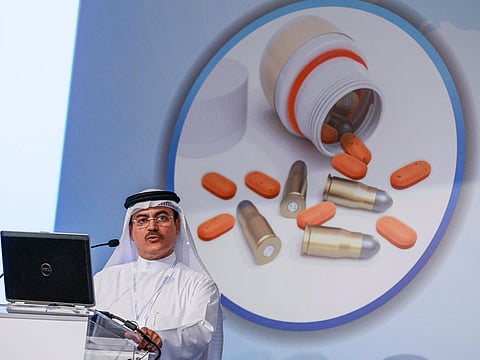UAE actively combating global counterfeit drug trade
Two-day conference on counterfeit drugs begins in Dubai

Dubai: In a global scenario of drug conterfeiting, the UAE is taking an active role in combating this problem, said Dr Ameen Hussain Al Amiri, Assistant Undersecretary for Public Health Policy and Licensing Sector at the Ministry of Health.
Dr Al Amiri is also the chairman of the two-day Emirates International Conference on Combating Drug Counterfeiting that began today in Dubai. The conference is being attended by international, regional and local experts as well as representatives from apex health bodies like the World Health Organisation (WHO) to discuss ways to combat the scourge of counterfeit drug trade.
The world-wide phenomenon of medicine counterfeiting continues to be an issue affecting patients’ health and causing deaths around the world.
Dr Al Amiri highlighted a World Health Authority (WHO) figure indicating that in two-thirds of the world, people die due to consuming counterfeit medicines.
Elaborating on the origin of these fraudulent medicines, he revealed that China and Africa are the biggest suppliers of counterfeit drugs which then make their way to Europe.
“Counterfeit medicines are a major problem facing developing and developed countries,” said Dr Al Amiri. “These products are handled by drug mafias and they trick the consumers who are unable to assess the quality of the medicine or differentiate between the real and counterfeit medicine,” said Al Amiri.
With 954 cases of counterfeit medicines seized in 2011 in East Asia, 381 cases in South America and 2.5 per cent coming from Arab countries, he said there is a real threat to people’s health internationally.
“There were not many cases seized in Africa, which is why it has the lowest percentage of cases seized when, in fact, it should be among the highest. There’s a lack of management, documentation and registration and, therefore, it becomes hard to keep track [of the cases].”
The definition of counterfeit medicine according to WHO, said Dr Al Amiri, is a drug which is deliberately and fraudulently mislabelled with respect to identity and/or source.
“Counterfeiting can apply to both branded and generic products and counterfeit products may include products with the correct ingredients or with the wrong ingredients, without active ingredients, with insufficient active ingredients or with fake packaging,” he explained.
Dr Al Amiri said the biggest concern when it comes to counterfeit medicines is that they can be easily duplicated and developing countries don’t have adequate resources or the regulations to prevent such medicines from entering the supply chain.
“The income generated from such a crime is very high for those involved. Europe recorded that 6 per cent of the total products seized on its borders in 2008 were counterfeit medicines,” said Dr Al Amiri.
Placing the danger of counterfeit medicines in its proper context, Dr Al Amiri said, “When counterfeit handbags are seized, for example, it’s not a health concern, but when medicines are counterfeited, it threatens people’s health because they can’t tell the difference.”
Highlighting the UAE’s vision and efforts to combat this global phenomenon, Dr Al Amiri said, “Our mission is to ensure customers get high-quality, safe and effective medicines and make the UAE free of counterfeit drugs. This is why all regulatory authorities such as the Ministry of Health, Dubai Police, Ministry of Interior and Dubai Customs are working together to bring about this change.”
Currently, Dr Al Amiri said, the UAE is putting caps on imports and all major products and making sure they are of good quality. The authorities are also detecting and alienating sources of counterfeit products.
“With our anti-counterfeit strategy, we will have risk communication and educational strategies which will focus on the risks of purchasing medicines from unknown websites outside the country and the negative impact of these medicines on health.”
He said Dubai Customs has been able to seize shipments being sent into the country.
“We have already increased the number of inspections to pharmacies, factories and warehouses, tightened sanctions against violators, controlled import of items which must be approved by the ministry and we are also monitoring advertisements.”
The phenomenon can be fought by countries sharing best practices and their plans of action, said Dr Al Amiri.
Sign up for the Daily Briefing
Get the latest news and updates straight to your inbox



